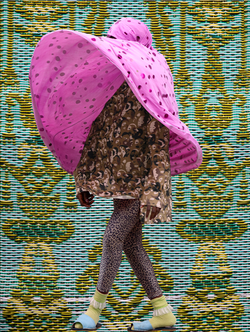



ENSHROUD
Fiber Pigment Print on Dibond
36 x 47.7 in | Series of 5 + 2 AP
18 x 23.85 in | Series of 5 + 2 AP
SEE PROJECT DESCRIPTION BELOW
 |  |  |
|---|---|---|
 |  |  |
 |  |  |
 |  |  |
 |  |  |
 |  |
ENSHROUD: The Veil as Identity, Resistance & Art
Lagos, Nigeria 2018
Enshroud is a digital collage series inspired by the vibrant lives of Muslim women in Lagos, Nigeria. Through abstract forms and patterns, the series elevates the veil beyond its physical presence, transforming it into an emblem of identity, self-expression, and cultural resistance.
In a nation where half the population identifies as Muslim, the hijab emerges as a central figure in faith, tradition, and bold fashion. Influenced by Nigeria’s rich cultural tapestry, veiling becomes a statement of individuality, with women twirling, dancing, and leaping across Lagos streets. Their flowing veils take on radiant, abstract shapes, juxtaposed against the intricate patterns of prayer mats ubiquitous in the city. This interplay of form and context not only celebrates Nigerian fashion’s distinctiveness but also challenges the homogenization of global style.
Enshroud delves into the veil’s multifaceted symbolism—its ancient origins as a marker of social status, its reduction in modern discourse to a politicized or vilified object, and its reclamation as a chosen expression of modesty, privacy, and cultural pride. In a globalized world where burqa bans and headscarf restrictions proliferate, the veil’s meaning oscillates between oppression and resistance. It is also a tool of empowerment, as seen in the Nike Pro Hijab or Halima Aden’s historic appearance in British Vogue. The series asks: who defines what is “socially acceptable” in matters of faith and personal expression?
In this visual narrative, the women shed the weight of politicization. Their veils, detached from societal judgment, become pure, playful expressions of freedom. Enshroud reimagines the veil as both a timeless and contemporary artifact —one of beauty, movement, and the transcendent power of choice. The series invites viewers to confront the complexities of cultural symbols and their evolving place in a polarized world.
